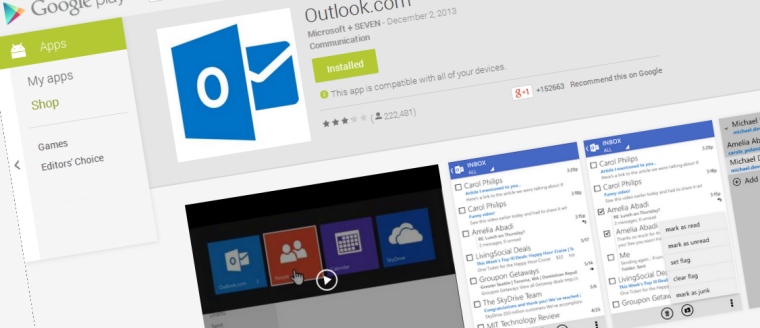New Microsoft CEO Satya Nadella is well aware of the online potential of the services, through his previous role as executive vice-president of Microsoft's Cloud and Enterprise group. Assuming that the Board chose Nadella in part because of his competence in handing this group, and that they believe (as many do) that part of Microsoft's future is to be rooted in being a universal services company (along with a number of hardware and OS plays), then Nadella has some strong cards to play to keep Microsoft not only involved in the mobile world, but to be a significant player.
Head into the iTunes App Store or Google Play and you'll find clients for OneDrive (née SkyDrive), you'll find Outlook.com email apps, Skype, OneNote, and others. Xbox Music has a beach-head on Android and iOS already, and it would not surprise me to see Xbox Video move towards a multi-platform approach as well.
These are all online components of Windows Phone. Calendar and Contacts synchronisation across devices is not as prevalent but is possible. In that sense Microsoft is already a silent partner on the #1 and #2 mobile platforms. It might not be a huge presence, but if you want to live a Microsoft life, you can (just about) do so with an iPhone or an Android device.

I'm sure that Microsoft will continue this process and integrate the online services into competing mobile ecosystems. While it's unlikely they will ever gain 'tier one' status, the goal should be to have Android and iOS run smoothly with OneDrive, Hotmail/Outlook, OneNote, XBox elements, Office 365, and Microsoft's other online elements. And at each opportunity, Microsoft should reinforce the message of 'One Microsoft everywhere' to the press and media.
But what to do with Windows Phone? Well, keep pushing and developing it, but perhaps at a slightly faster rate now.
Windows Phone already makes good to excellent use of Microsoft's online services, and I don't see that changing in the short or long-term future. While Nokia's Devices and Services division is not making a profit, it would not be the first division of Microsoft to be financially supported by others. There may be some savings to be made with a tighter integration of hardware and operating system development, or the structure of the staffing may allow for some more reductions.
But I don't see Microsoft stopping the development of Windows Phone. Just as the Surface devices show the world Redmond's vision of a 'connected services' ultrabook/tablet style device, so the Windows Phone Lumia devices will be able to show what Microsoft can do with an unfettered mobile operating system.
Windows Phone becomes a 'Nexus' style vision, the marrying of Microsoft's services with a mobile device. It helps that it has a decent slice of the market and a number of supporters. It also acts as a firebreak stopping other competitors swinging into the mobile space who might not be as amenable to Microsoft apps and services on their devices. Right now the vast majority of mobile handsets can access Microsoft's services in one form or another, and Microsoft's continued investment in Windows Phone not only acts as a shop front, but also as a defensive barrier to stop a fourth player getting close to the 10% market share that WP holds.
Microsoft is nowhere near being 'out' of the mobile game. Windows Phone continues to sell handsets and make (small) market share gains. Until there is another major disruptive moment, it's unlikely that Microsoft can get ahead of Android (iOS is a far off, but not impossible, target). But Microsoft are in the game. With the use of their online services they can embrace the other platforms, they can extend their presence on mobile, and by skating to where the mobile ecosystem is going to be in 2015 and beyond, Microsoft can be ready to provide the services that matter to every mobile user on the planet, as well as have a polished, integrated, and connected Windows Phone experience.
